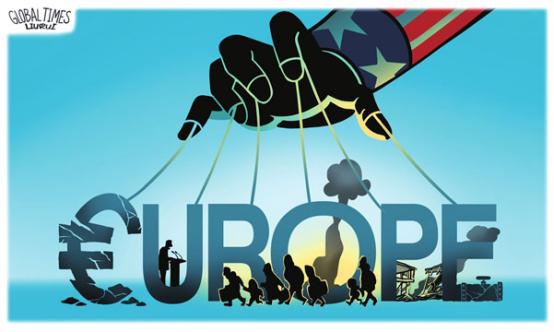HE Zhigao:Europe seeks breakthrough between security and autonomy
He Zhigao, a researcher in the Institute of European Studies at the Chinese Academy of Social Sciences.
The article was originally published in GLOBAL TIMES on March 14, 2022.The article has been authorized.

US' game of manipulation Illustration: Liu Rui/GT
Since the end of the World War II, European integration has advanced remarkably. In addition to the efforts of European countries, the strategic support of the US has been important. During the Cold War, the US' global strategy focused on containment of alternative centers of power to maintain dominance.
In Eurasia continent, where geopolitical competition and cooperation are complex, the US intends to ensure a balance of power in East Asia and Europe. Although the US and Europe have always had different interests and priorities, and transatlantic relations have often been influenced by economic competition and political controversies, nearly every US administration, ranging from that of Harry Truman, Dwight Eisenhower to Barack Obama, has supported the European integration process.
In recent years, calls for European strategic autonomy have been rising. The Trump administration's strategy stimulated the awakening of Europe's "strategic autonomy." The "America First" foreign policy has brought a huge impact on US-Europe relations. The US under Trump had a critical and negative attitude toward multilateral cooperation and the EU, and even undermined the European integration process.
European integration has entered a period of deep adjustment, as it is difficult for its influence to increase significantly in the short term. The adjustment takes place against the backdrop of intensified geopolitical games and the impact of US unilateralism, which has undoubtedly exacerbated the strategic anxiety of Europe. The EU cannot stay away from the geopolitical competition among major powers. Great power competition is not conducive to the EU's promotion of its multilateral vision for world order. The EU's dilemma and internal division offer the US an opportunity to exploit profit at the EU's expense.
The outbreak of the Russia-Ukraine conflict further stimulated the awakening of the concept - geopolitical Europe. However, Europe is too dependent on the US and NATO for security and defense. It can't change or influence the US' foreign policy decisions. The US can still make its Western allies take sides. Europe has to cooperate with US' policy toward Russia, isolate Russia politically and sanction it economically.
The EU's past performance is considered weak when it comes to affairs relating to its own security interests, economic development and relations with its most important neighbor, Russia. The Russia-Ukraine conflict makes the European security order face severe challenges, and Europe's demands for security and self-defense have significantly intensified.
In his blog on March 3, EU High Representative Josep Borrell wrote "We can no longer trust that appealing to the rule of law and developing trade relations will turn the world into a peaceful place [...] We need to put more defence and security in our mind-set."
Given that "geopolitical Europe" is a long-term goal, Europe will maintain its existing military alliance with the US while continuing to pursue the goal of strategic autonomy. For this reason, it may deviate from predetermined development goals. The possibility of seeking defense independence and strategic autonomy could be seriously reduced and the EU would rely more on NATO, led by the US.
A strong, prosperous, and solidified Europe remains a powerful partner for the US to maintain its postwar order. After the shock of the Trump administration, the Biden camp believes that a more united transatlantic relationship can better handle global challenges. Biden is more reliant on partners and alliances to achieve US national interests. EU leaders believe that the Biden administration will be a new beginning for the EU and the US to reset a global partnership, in which they can recommit to shaping the global agenda and upholding multilateralism, solidarity, and shared values.
However, the US' definition of the role of its allies and partners has become increasingly conditional. If these countries expect to obtain help or guarantees from the US, they must contribute a corresponding share according to the interests of the US. To this end, Europe must make greater efforts.
After all, the asymmetry in security is still a basic character of transatlantic relations, and Europe cannot get rid of the dependence on the US. While EU member states have different foreign and security policy priorities, an increase in overall vulnerability and insecurity will prompt them to seek unity within the EU.
